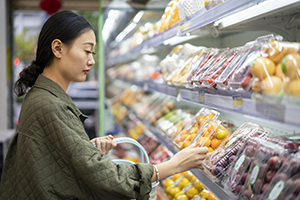 Consumers are looking for health-focused products that are also sustainable. This trend is driving the focus on nutritional enhancements.
Consumers are looking for health-focused products that are also sustainable. This trend is driving the focus on nutritional enhancements.
- Functional Foods and Beverages: Targeted Health Benefits
Functional foods and beverage products designed to provide specific health benefits beyond basic nutrition are gaining traction. Consumers are increasingly seeking products that support:
- Gut Health: Incorporation of prebiotics like inulin and chicory root, and probiotic-rich fermented foods such as kimchi and pickles, to promote a healthy gut microbiome.
- Cognitive Function and Mood: Use of nootropics like L-theanine, adaptogens such as ashwagandha, and omega-3 fatty acids from flaxseeds and chia seeds to enhance memory, focus, and mood regulation.
- Immunity and Inflammation: Inclusion of ingredients like vitamin C, ginger, turmeric, and elderberry to boost the immune system and reduce inflammation.
- Energy and Endurance: Development of products featuring clean energy sources such as B vitamins, MCT oil, and caffeine derived from tea for sustained energy.
- Women’s Health: Formulation of products targeting hormonal health, bone health, and reproductive health, incorporating ingredients like maca root, ashwagandha, flaxseed, calcium, magnesium, and B vitamins.
The functional food and beverage market in the United States reached $320 billion in 2024 and is projected to grow to $384 billion by 2028.
- Plant-Based Innovations and Protein Diversification
The plant-based movement continues to evolve, with a focus on sustainability and protein diversification. Emerging trends include:
- Aquatic Ingredients: Utilization of microalgae, kelp, spirulina, seaweed, and water lentils as sustainable, nutrient-rich protein sources.
- Alternative Proteins: Adoption of mycoprotein and chickpea proteins for their rich texture, taste, and low environmental footprint.
- Precision Fermentation: Advancements in biotechnology enabling the creation of nondairy products with textures and qualities rivaling traditional dairy.
These innovations cater to health-conscious consumers and address environmental concerns associated with traditional agriculture.
Discover ULTRUS, software to help organizations succeed through safe and sustainable performance. Learn more here!
- Personalized Nutrition and AI Integration
Advancements in technology are facilitating personalized nutrition experiences. Key developments include:
- Customized Products: Availability of personalized meal kits, custom supplements, and tailored snack boxes designed to meet individual dietary needs and health goals.
- AI-Driven Insights: Use of AI and machine learning to analyze consumer preferences and health data, enabling the creation of products that cater to specific diets and support health conditions.
- Smart Beverages: Development of “smart” beverages that deliver functional benefits, such as enhancing cognitive performance, improving mood, or boosting energy, using bioactive ingredients combined with AI-driven personalization.
These innovations allow consumers to make informed choices about their food and drink consumption, aligning with their unique health needs.
- Clean Label and Sustainable Practices
Consumers are increasingly seeking transparency and sustainability in their food choices. Key trends include:
- Clean Label Products: Demand for products with minimal processing and recognizable ingredients.
- Eco-Friendly Packaging: Adoption of recycled materials, biodegradable packaging, and efforts to reduce food waste throughout the supply chain.
- Upcycled Foods: Creation of products from ingredients that would otherwise be discarded, contributing to a circular economy and reducing environmental impact.
These practices not only meet consumer expectations but also contribute to environmental sustainability.
- Market Outlook and Opportunities
The specialty food ingredients market is projected to grow by $59.02 billion from 2024 to 2028, driven by the growing demand for plant-based specialty food ingredients.
Manufacturers and suppliers should consider the following strategies to capitalize on these trends:
- Invest in R&D: Focus on developing innovative products that meet specific health needs and dietary preferences.
- Collaborate with Tech Firms: Partner with technology companies to integrate AI and machine learning into product development and personalization.
- Embrace Sustainability: Implement sustainable sourcing and packaging practices to meet consumer expectations and regulatory requirements.
By aligning with these trends, food and beverage formulators and suppliers can position themselves for success in the evolving market landscape.
The views, opinions and technical analyses presented here are those of the author or advertiser, and are not necessarily those of ULProspector.com or UL Solutions. The appearance of this content in the UL Prospector Knowledge Center does not constitute an endorsement by UL Solutions or its affiliates.
All content is subject to copyright and may not be reproduced without prior authorization from UL Solutions or the content author.
The content has been made available for informational and educational purposes only. While the editors of this site may verify the accuracy of its content from time to time, we assume no responsibility for errors made by the author, editorial staff or any other contributor.
UL Solutions does not make any representations or warranties with respect to the accuracy, applicability, fitness or completeness of the content. UL Solutions does not warrant the performance, effectiveness or applicability of sites listed or linked to in any content.
